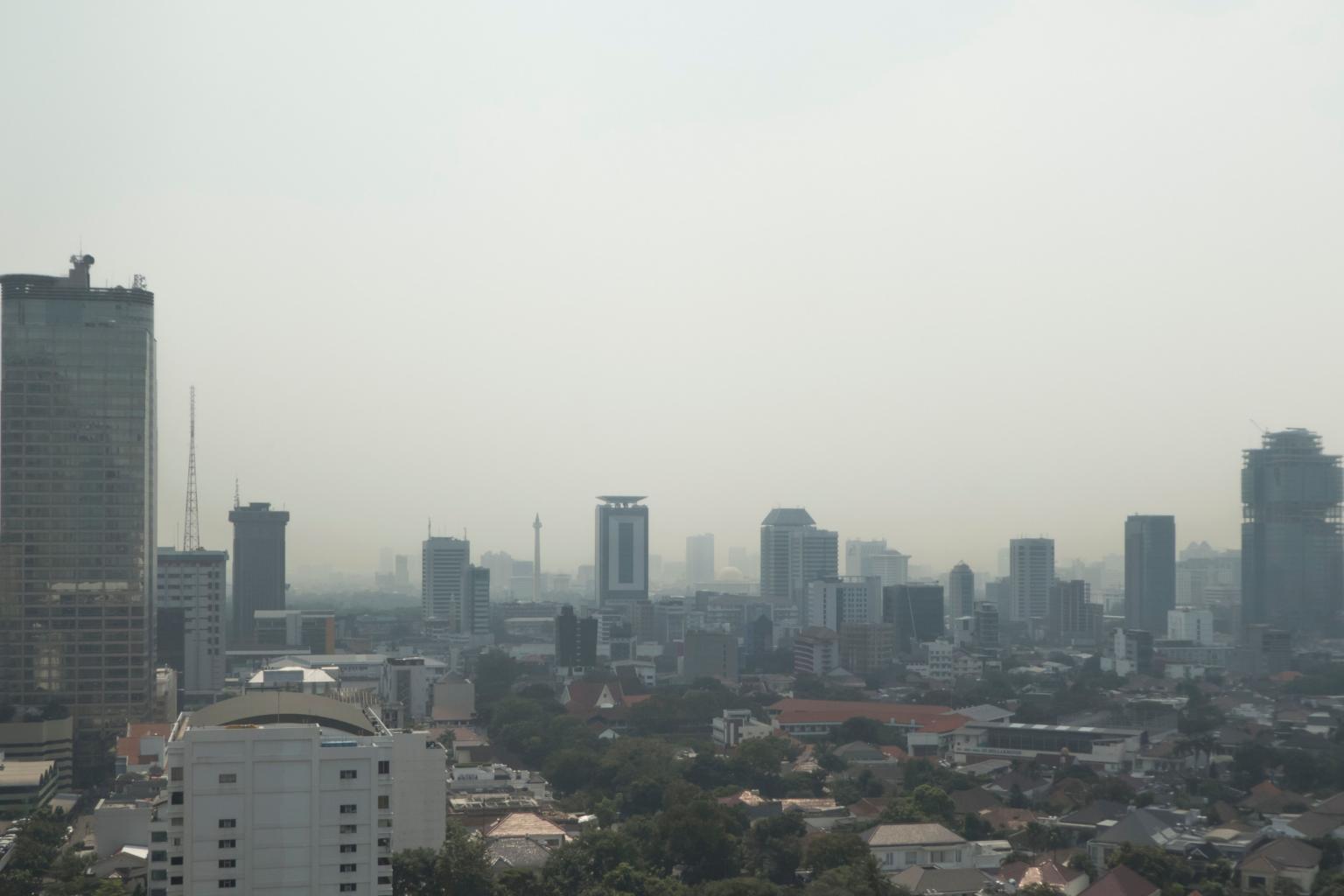Jakartans finding it harder to breathe; capital ranks as world's third most polluted city
Sign up now: Get insights on Asia's fast-moving developments

Haze shrouds the Indonesian capital Jakarta on July 27, 2017.
PHOTO: AFP
Follow topic:
JAKARTA (The Jakarta Post/Asia News Network) - Anyone who wants to live a healthy life may have to consider moving out of Jakarta, as the city continues to climb up the rankings for the world's worst air quality.
Based on a real-time air quality index uploaded to the Airvisual application at midday on Friday (Sept 15), Jakarta ranked third as the most polluted city in the world, after Beijing and Dhaka, among 70 cities measured across the globe.
In mid-August, the application showed that Jakarta was at the top of the list, followed by Ankara, Turkey and Lahore, Pakistan.
Residents in the Indonesian capital may have experienced the worsening air quality due to hazy air and the sharp smell of exhaust fumes from vehicles.
Filani Olyvia, 25, a resident of Mampang Prapatan, in South Jakarta, said she was worried about her health because she rides an ojek (motorcycle taxi) to work every day.
"I'm afraid of catching respiratory diseases, because every day I have to deal with pollution from motorcycles and cars. In Mampang, where traffic congestion is really bad, I can spend a lot of time on the street," she said.
Currently, Filani said she has two motorcyclist friends who suffer from respiratory problems. So, she said, she always uses a health mask while riding an ojek.
Greenpeace Indonesia revealed that air pollution in Greater Jakarta, with its high exposure to a carcinogenic pollutant called PM 2.5, was three times higher than the maximum "safe" level recommended by the World Health Organisation of 25 micrograms per cubic metre.
According to research conducted by Greenpeace from January to June, the air in Greater Jakarta was considered "unhealthy" and hazardous for residents, especially children, pregnant women and the elderly.
"In general, there has been a significant increase in premature deaths resulting from strokes, heart disease, respiratory infections (or what the local authorities call ISPA) in children, lung cancer and chronic lung diseases," said Bondan Andriyanu, Greenpeace campaign spokesman for climate and energy.
Using the risk analysis from the Global Burden of Disease Project conducted by the Institute for Health Metrics and Evaluation, Greenpeace found that the great increase of people who suffered from pollution-related diseases occurred in areas that were highly exposed to the pollutant.
For example, in Cibubur, East Jakarta, the area with the worst air pollution with PM 2.5 levels reaching 106 micrograms per cubic meter, children have 105 per cent more chance of suffering from ISPA, while the risk of stroke sky rocketed by 150 per cent.
Greenpeace's findings are supported by data from the Jakarta Health Agency that shows that respiratory diseases rank first among the 10 most common diseases suffered by Jakartans.
Jakarta Smart City has also uploaded data showing that thousands of Jakartans, especially those who live near busy streets such as in Cilandak, Setiabudi, Pancoran and Pasar Minggu, South Jakarta, suffer from respiratory problems.
In 2016, the number of children in Jakarta who suffered pneumonia, which can be triggered by air pollution, was 41,053, almost double the previous year's total of 24,193 affected children.
The secretary-general of the Indonesian Doctors Association (IDI), Moh. Adib Khumaidi, said pneumonia could be triggered by exposure to PM 2.5.
In general, poor air quality could cause respiratory problems, he said.
Despite the increased number of cases of respiratory illnesses in the city, the Jakarta Health Agency said it had not conducted research on the impacts of air pollution on residents' health.
However, Dicky Alsadik, head of environmental health at the Jakarta Health Agency, said air pollution could cause respiratory problems as the toxins might disturb the function of the body's organs and negatively affect one's immunity.
To protect themselves against emissions of PM2.5, residents have been advised by Greenpeace to wear N95 surgical masks, instead of regular disposable masks.
"We also urge the government to establish a proper, publicly-accessible air quality monitoring system for residents," he said.
Technical unit head of the environment laboratory at the Jakarta Environment Agency, Diah Ratna Ambarwati, said that next year the agency would procure equipment to analyse PM 2.5, as it currently only has devices to monitor PM 10.

